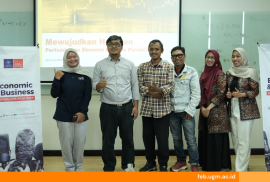Covid-19, a pandemic that was never predicted before, has given a big impact towards people’s behavior. Considering that issue, on Wednesday (20/05), Department of Economics, Faculty of Economics and Business, Universitas Gadjah Mada (FEB UGM) held SinarKU (Seminar and Public Lecture) entitled “Behavioural and Experimental Research During the 2020 Pandemic”. Approximately 121 participants attended the discussion, both from academia and the general public. This discussion was hosted by Putu Sanjiwacika R., S.E, M.Sc as the moderator and was attended by speakers, namely Lecturers from the Department of Economics FEB UGM, M. Ryan Sanjaya, Ph.D.
The discussion was started by Ryan’s presentation namely “behavioral and experimental research in social science during the pandemic”. Ryan said that the pandemic impact was divided into three parts, that are small, medium and large impacts. Pandemic is apart from all the negative effects and will positively affect the research instead. “The pandemic will change the way we conduct research and create new topics for research at the same time.” he said.
Ryan continued with a presentation of the experimental method. He explained that the research process is started by preparing and submitting research questions, finding theory of findings, designing experiments, observing behavior, making conclusions, and suggesting evaluations for improvement. He also discussed a lab experience, where economists conduct various experiments. He explained that lab experience allows the economists to make modifications to the experiments so that they can adjust to what is studied. “After conducting experiments we can get the expected outcomes, such as behavior,” Ryan said.
Regarding policies and behavior due to the Covid-19 pandemic, Ryan suggested that good policies are based on an understanding of the community, if the government is aware that the public does have knowledge about Covid-19, then policy makers must prepare biases for what will happen in the community. He gave an example of events in the UK, where the behavioral ethics issue of the UK Government in implementing distancing policy by considering the time, because according to him if the distancing policy is applied too fast, people will be exhausted and make complaints.
For Indonesia itself, to fight the Covid-19 pandemic in general the same as other countries, including building trust, establishing social distance, and creating certainty. In addition, effective public communication is also needed. But Indonesia is not like Britain, Europe, or other rich countries. In order for our people’s behavior to change, according to Ryan, people need to have abilities, opportunities, and motivation. It is undeniable that many Indonesians have the luxury of opportunity and limited social protection, therefore, community participation must be encouraged. Currently in Indonesia, social distancing has been done, but according to Ryan what is lacking from the Indonesian government is the lack of good public communication, and Indonesia must encourage community participation. “We know that Indonesia’s social protection is inadequate, consequently, it is not always possible to depend on the government,” Ryan said.
An unprecedented time requires extraordinary action. Behavioral research must adapt to relying more on online experiments or surveys. At present, many opportunities are sufficient for research, but it requires time and theoretical guidance to be properly tested using economic experiments. Trust in government and social or community involvement is very important in times of crisis, especially in countries with limited financial capacity. Ryan concluded the material presentation by quoting Kahneman’s words about policy, where policy is ultimately about people, what they want and what is best for them. Every policy question involves assumptions about human nature, in particular about the choices people may make and the consequences of their choices for themselves and for society.
Translator: Laras OIA




